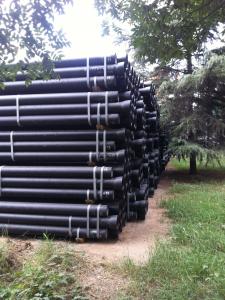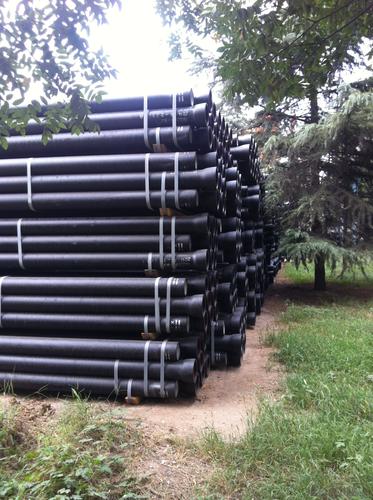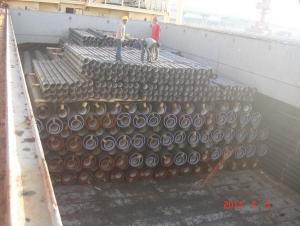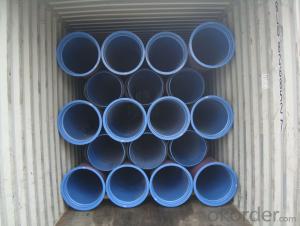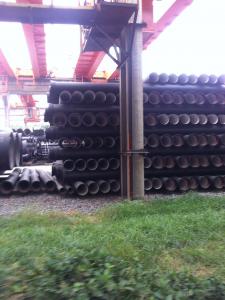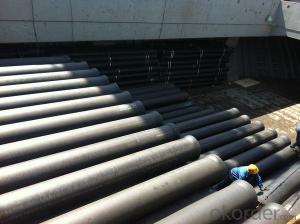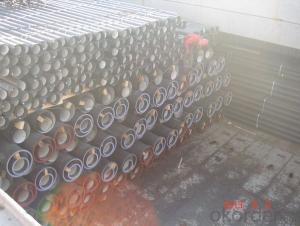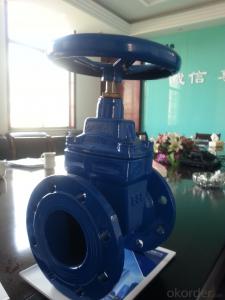DUCTILE IRON PIPE AND PIPE FITTINGS K8 CLASS DN100
- Loading Port:
- Tianjin
- Payment Terms:
- TT OR LC
- Min Order Qty:
- 23 pc
- Supply Capability:
- 3000 pc/month
OKorder Service Pledge
OKorder Financial Service
You Might Also Like
Material : Ductile Cast Iron
Size Range : DN 80mm to DN 2000mm
Unit Effective Length : 6m or 5.7m
Manufacture Standard: ISO 2531:1998/ EN 545:2006/EN 598:2007
Annual capacity : 200,000 tons
Coating Exterior: Zinc 130g/m2 according to ISO 8179-1 and bitumen coating 70 microns.
Cement Interior: Portland Cement/ High Alumina Cement/ Sulphate Resisting Cement Lining according to ISO 4179
Special requirements on external coating and internal lining can be applied
We also provide accessories such as SBR/EPDM rubber gaskets, lubricant paste, pipe caps, PE sleeves, etc.
Additional Parts:
Each pipe is strictly inspected according to related standard to ensure permanently high performance.
Easy Installation at site and service free for life
Long Service Lifespan
Quotation will arrive you within 24hours once we get your inquiry.
We guarantee offering you a competitive price.
A copy of original inspection reports of pipes will be offered after shipment.
Photos of loading process will be sent to the customer after shipment effect.
We will follow-up the delivery progress after shipment effect and update to the customer on weekly basis.
- Q: How do ductile iron pipes handle pressure surges in pumping stations?
- Ductile iron pipes are specifically designed to handle pressure surges in pumping stations effectively. The inherent strength and flexibility of ductile iron make it well-suited to withstand the sudden increase in pressure that can occur during pump start-up or shutdown. One of the key features of ductile iron pipes is their ability to absorb and dissipate energy. When a pressure surge occurs, the ductile iron pipes have the capacity to absorb the excess pressure and distribute it evenly throughout the pipe network. This helps to minimize the impact of the surge and prevent any potential damage to the pipes or the pumping station. Additionally, ductile iron pipes have a high resistance to impact and stress, which further enhances their ability to handle pressure surges. The pipes are manufactured using a unique process that imparts strength and durability, allowing them to withstand the forces exerted during pressure fluctuations without any significant deformation or failure. Furthermore, ductile iron pipes have a smooth internal surface, which reduces friction and turbulence within the pipe network. This smooth flow characteristic helps to mitigate the effects of pressure surges by allowing the water to move efficiently without creating additional stress on the pipes. In summary, ductile iron pipes are specifically engineered to handle pressure surges in pumping stations by absorbing and dissipating the excess pressure, withstanding the impact and stress, and promoting smooth flow. Their robustness and reliability make them an ideal choice for applications where pressure fluctuations are common, ensuring the longevity and efficiency of the pumping infrastructure.
- Q: How can the ductile iron pipe depress the elbow so as to prevent it from being opened?
- The way to connect with the pipe is: direct welding (the most commonly used way), flange connection, hot melt connection, electric melting connection, threaded connection and socket connection. According to the production process can be divided into: welding elbow, stamping elbow, push elbow, casting elbow, etc..
- Q: Can ductile iron pipes be used in areas with high soil salinity?
- Indeed, areas with high soil salinity can accommodate the use of ductile iron pipes. These pipes possess notable resistance to corrosion, rendering them compatible with different soil conditions, even those with elevated salinity levels. Usually, these pipes are coated with a safeguarding layer, such as polyethylene or zinc, which bolsters their capacity to ward off corrosion caused by saltwater or saline soils. Furthermore, employing appropriate installation methods, such as meticulous backfilling and soil compaction around the pipes, can effectively mitigate the potential consequences of high soil salinity on the durability and effectiveness of ductile iron pipes.
- Q: What is the expected fatigue life of ductile iron pipes under cyclic loading?
- The fatigue life of ductile iron pipes under cyclic loading can vary due to factors such as the magnitude and frequency of the loading, material quality, pipe design and installation, and environmental conditions. Ductile iron possesses high strength and ductility, enabling it to withstand cyclic loading to a certain extent. However, like any material, it is susceptible to fatigue failure over time. Engineers commonly employ fatigue analysis and testing methods to estimate the expected fatigue life of ductile iron pipes. These methods involve subjecting representative samples of the pipes to controlled cyclic loading and determining the number of cycles required for failure. The results of these tests can then be used to extrapolate the expected fatigue life of the pipes under similar loading conditions. It is important to note that the expected fatigue life can significantly differ depending on the specific conditions and loading patterns experienced by the pipes in a given application. Therefore, it is crucial to consider operational demands, maintenance practices, and the overall structural integrity of the pipeline system. Additionally, adhering to appropriate design standards and guidelines, along with regular inspection and maintenance, can help enhance the fatigue life of ductile iron pipes. In conclusion, while providing a specific value for the expected fatigue life of ductile iron pipes under cyclic loading is challenging, engineers can estimate it through fatigue analysis and testing methods. Considering various factors and maintaining the pipes properly is essential to ensure their longevity and prevent potential failures.
- Q: Qianwei County ductile iron pipe which tool to use cutting convenience?
- Cutting the ductile iron pipe by grinding is grinding and cutting the ductile iron tube continuously by grinding wheel until it breaks. To cut ductile iron pipes by grinding cutting method, the cutting parts should be crossed at first so as to avoid deviation during cutting. Place the drawn ductile iron tube in the cutting machine and fix the ductile iron tube and clamp it with a built-in clamp. Next, start the cutting machine and gradually press the handle of the cutting machine. The grinding wheel cuts into the ductile iron tube until the ductile iron pipe is cut off. When exerting pressure on the handle, do not force too hard at once, otherwise it will cause the grinding wheel to break. In the operation of the machine, the operator must not stand on the side of the grinding wheel, so as to avoid accidents. When the wheel appears in cutting, vibration, shaking, uneven phenomenon, should immediately stop the operation, check whether there is the wheel gap, if damaged, must be promptly replaced, to ensure safety and normal. Good cutting ductile cast iron pipe section, if there is to prevent the use of burrs, can be removed by grinding or machining file.
- Q: Are ductile iron pipes suitable for acidic or alkaline environments?
- Ductile iron pipes can be used in both acidic and alkaline environments, but their performance may vary depending on the conditions. Ductile iron is a type of cast iron that has been strengthened and made more flexible by adding a small amount of magnesium. This treatment allows the pipes to withstand various conditions, including those found in acidic or alkaline environments. In acidic environments, ductile iron pipes resist corrosion well. The iron in the pipes reacts with the acid to create a protective layer of iron oxide, which prevents further corrosion. However, it is important to consider factors like acid concentration and temperature, as they can affect the performance of ductile iron pipes in acidic environments. In highly concentrated or extremely acidic conditions, materials like stainless steel or corrosion-resistant alloys may be more suitable. Similarly, ductile iron pipes also resist corrosion in alkaline environments. The alkaline conditions help to passivate the iron surface, forming a protective layer that prevents further corrosion. However, the specific conditions and alkali concentrations may influence the performance of ductile iron pipes in alkaline environments. In cases of very high alkalinity or extreme temperatures, materials like plastic or concrete pipes may be more appropriate. It is important to note that regular maintenance and monitoring are necessary to ensure the long-term performance of ductile iron pipes in both acidic and alkaline environments. Monitoring the pH levels and other chemical characteristics of the environment is crucial to identify any potential issues or required maintenance. Consulting experts or engineers in the field can provide valuable insights and guidance in selecting the most suitable materials for specific acidic or alkaline environments.
- Q: What are the different joint types available for ductile iron pipes?
- Ductile iron pipes offer various joint types that are essential for maintaining the integrity and reliability of the pipeline system. 1. The push-on joint is the most prevalent joint used for ductile iron pipes. It involves inserting a rubber gasket into the bell end of the pipe and then pushing the spigot end into the bell, ensuring a tight seal. This joint is easy to assemble, quick, and has excellent resistance against soil movement and water pressure. 2. The mechanical joint involves a gland and follower that are secured around the spigot end of the pipe using bolts and nuts. It provides a robust and durable connection and is commonly used for larger diameter pipes or applications that expect higher pressure or thrust loads. 3. Flanged joints are utilized when connecting pipes to other components like valves or fittings. The pipe ends are machined and equipped with flanges that are bolted together using gaskets, ensuring a secure connection. These joints find frequent use in industrial applications or situations requiring frequent disassembly. 4. Restrained joints are designed to withstand significant external forces and prevent separation or pulling apart of the pipe. They typically combine mechanical joint components, such as bolts and glands, with additional restraining elements like welded or bolted-on restraints. These joints are commonly employed in high-pressure applications or situations where substantial external forces are present. Choosing the appropriate joint type is crucial and depends on factors such as pipeline design, operating conditions, and installation requirements. Seeking guidance from experienced engineers or pipe manufacturers can aid in determining the most suitable joint type for a specific ductile iron pipe application.
- Q: Are ductile iron pipes suitable for use in agricultural applications?
- Indeed, agricultural applications can benefit from the utilization of ductile iron pipes. Renowned for their remarkable strength and durability, these pipes are well-suited to endure the substantial loads and pressures frequently encountered in agricultural operations. Furthermore, their exceptional resistance to corrosion proves invaluable in agricultural settings where pipes may come into contact with chemicals or fertilizers. Additionally, the long lifespan of ductile iron pipes diminishes the necessity for frequent replacements, thereby minimizing maintenance expenses. In summary, the dependable choice of ductile iron pipes stems from their resilient nature and capacity to meet diverse agricultural demands.
- Q: How are ductile iron pipes protected against stray electrical currents?
- To safeguard water and sewer systems, ductile iron pipes are shielded from stray electrical currents through a technique called cathodic protection. This process entails the application of a low-voltage direct current (DC) to the pipes, generating a defensive electrical field around them. To achieve cathodic protection, sacrificial anodes or impressed current systems are installed near the ductile iron pipes. Sacrificial anodes, composed of a more electrically active metal like zinc or magnesium, are connected to the pipes and act as the electrical current source. Over time, these anodes corrode, sacrificing themselves to shield the pipes from corrosion caused by stray electrical currents. However, impressed current systems utilize an external power source to supply the protective electrical current. Rectifiers are employed to convert alternating current (AC) to direct current (DC), which is then administered to the pipes through anodes. This approach provides greater control over the amount of current applied, ensuring optimal protection. In both scenarios, the electrical current flowing through the sacrificial anodes or impressed current systems establishes a protective barrier around the ductile iron pipes. This barrier impedes the flow of stray electrical currents through the pipes, thus diminishing the risk of corrosion and prolonging the infrastructure's lifespan. Regular monitoring and maintenance of the cathodic protection system are crucial to uphold its efficacy. This involves inspecting the anodes, assessing the levels of electrical current, and making any necessary adjustments or replacements to maintain the desired level of protection. To summarize, cathodic protection is a dependable and widely utilized method for safeguarding ductile iron pipes against stray electrical currents. By preserving the integrity and longevity of water and sewer systems, it plays a vital role in ensuring their functionality.
- Q: Can ductile iron pipes be used for underground water treatment systems?
- Yes, ductile iron pipes can be used for underground water treatment systems. Ductile iron pipes are known for their strength and durability, making them suitable for various applications, including underground water treatment systems. These pipes are resistant to corrosion, making them ideal for transporting water, even in harsh underground environments. Additionally, ductile iron pipes have a high load-bearing capacity, allowing them to withstand the pressure and weight of the soil above. They are also versatile and can be easily installed and maintained, making them a practical choice for underground water treatment systems.
Send your message to us
DUCTILE IRON PIPE AND PIPE FITTINGS K8 CLASS DN100
- Loading Port:
- Tianjin
- Payment Terms:
- TT OR LC
- Min Order Qty:
- 23 pc
- Supply Capability:
- 3000 pc/month
OKorder Service Pledge
OKorder Financial Service
Similar products
Hot products
Hot Searches
Related keywords
